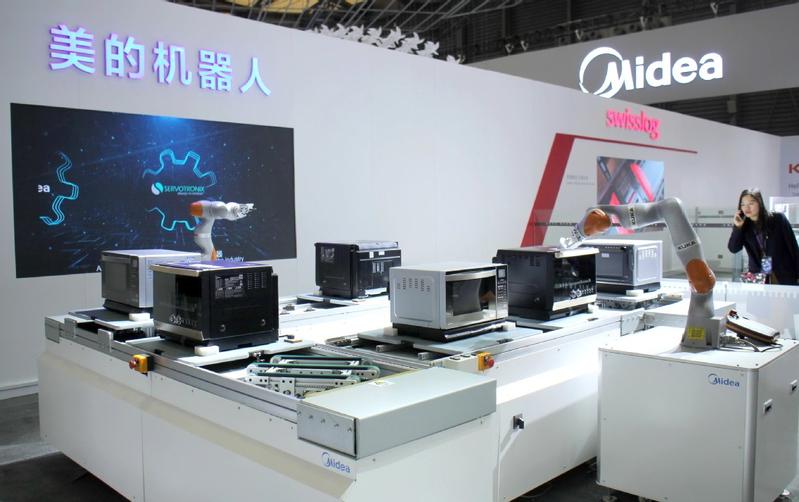 In this undated file photo, a visitor checks out Midea home appliances during an exhibition in Shanghai. (XING YUN / CHINA DAILY)
In this undated file photo, a visitor checks out Midea home appliances during an exhibition in Shanghai. (XING YUN / CHINA DAILY)
Despite the challenges posed by the COVID-19 pandemic, Midea Group, a Chinese home appliance maker, will expand its global footprint this year, strengthen the layout of its supply chain, and increase its investment in Thailand, Egypt and Brazil.
We are more willing to build joint ventures in overseas markets, especially countries and regions taking part in the Belt and Road Initiative.
Fang Hongbo, chairman and president of Midea
Although overseas orders increased by 10 percent year-on-year in the first half of this year, that was not enough to avoid declines in both revenue and net profit.
First-half net profit was 13.90 billion yuan (US$2 billion), down 8.29 percent, on a revenue of 139.70 billion yuan, down 9.47 percent. More than 40 percent of its revenue came from overseas markets as Midea added more than 11,000 sales outlets abroad.
The company underlined its e-commerce business. Its products now cover major online retail websites in Italy, the United Kingdom and France.
"We are more willing to build joint ventures in overseas markets, especially countries and regions taking part in the Belt and Road Initiative," said Fang Hongbo, chairman and president of Midea.
Fang noted that growing market demand in emerging countries and regions, along with an improving domestic demand for smart home appliances, will help boost sales in the years ahead.
"We need to rethink the layout of overseas manufacturing bases," Wang Jianguo, vice-president of Midea, said.
The company will also look for suitable places to establish a manufacturing base in North America.
ALSO READ: China's Midea to construct technology park in India
Established in 1968, the Foshan, Guangdong province-based Midea makes air conditioners, refrigerators, laundry appliances, kitchen appliances and various small home appliances. It has 28 research and development centers and 34 major production bases around the world.
Its orders from overseas markets rose by 26 percent on a yearly basis in the first quarter. Wang has strong confidence that the company's performance in the second half of this year will improve despite COVID-related changes and uncertainties.
The company will strengthen its global supply chains and increase investment in Thailand, Egypt and Brazil. In April, Midea began to build an air conditioner factory in Thailand. It is also preparing to build a manufacturing base in Egypt, its 18th overseas.
First-half retail sales of home appliances in China were worth 369 billion yuan, down 14 percent year-on-year, due to COVID-19, said a report released by the China Center for Information Industry Development, which is part of the Ministry of Industry and Information Technology.
The CCIID report also said the market for most of home appliances has shrunk and sales fell in the first half of the year.
"The growth rate of the domestic home appliance market is dropping, so major players should accelerate steps to expand in overseas markets such as North America, South America, Africa and Europe as they continue to show huge growth potential in low, medium and high-end products," said Liang Zhenpeng, a consumer electronics analyst.
Liang noted in the past most of the Chinese enterprises adopted the original equipment manufacturer or OEM model, but nowadays they tend to build their own brands to be competitive globally.
Midea's more than 150,000 staff members man its 17 production bases in overseas markets, with its products sold in more than 200 countries and regions. Midea has set up overseas 18 R&D centers in the United States, Japan, Italy, Germany, Singapore, Austria, Israel and other countries.
Since the establishment of its first overseas plant in Vietnam in 2007, Midea has efficiently expanded its operations. The company has stepped up its go-global push in recent years through mergers and acquisitions.
Midea acquired a 32.5 percent stake in Egypt-listed air conditioner manufacturer Miraco. It took a majority stake in German industrial robotics manufacturer Kuka in 2016, marking another important step in the company's bid to expand into automation and smart manufacturing.
In 2017, it purchased more than a 50 percent stake in Israeli motion solution provider Servotronix Motion Control. Midea also acquired an 80 percent stake in Italian air conditioner maker Clivet SpA and bought the white home appliance products business of Japanese home appliance manufacturer Toshiba Corp in 2016.
The traditional home appliance market is almost saturated and companies need to seek new growth points, said Dong Min, an independent researcher of the home appliances sector.
"Expansion into overseas markets could not only relieve the pressure of high inventory in the domestic market but increase the international influence of Chinese home appliance companies."
READ MORE: Midea's global strategy pays off
Midea announced in 2018 it would invest 13.5 billion Indian rupees over the next five years to set up a science and technology park in India. Covering an area of roughly 270,000 square meters, the project is estimated to generate direct and indirect employment opportunities for more than 2,000 people.
The park will produce 500,000 refrigerators, washing machines, water purifiers and water heaters respectively, 1.5 million household air conditioners, 250,000 commercial air conditioners, and 4.5 million air conditioner compressors annually.


